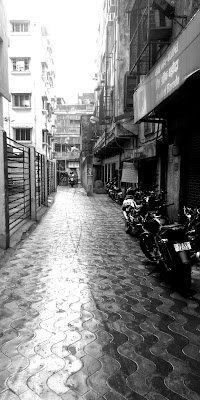Subscribe
 |
| An alley opposite the Subodh Mullick Square |
Is there really a graveyard of memories beyond our hearts? Or is it just the way our memory functions, turning the outsides into a vast scene of mourning?
A graveyard is not only the place for the dead but also for those who are related to the dead- the living, who mourns and remembers a time which would not be coming back. A place of remembrance and forgetting… May be in that sense, archives and museums are more akin to graveyards.
On a rainy afternoon, my visit to Chandni Chowk, evoked the sense of visiting a graveyard to me, a graveyard of technology that is. In retrospect, it seems may be such comparisons are not fair. For it is a place that holds an array of repair shops for both presently existing technology, very much in vogue; and slightly older technologies (and also sometimes, ‘disappearing’ technology)- a place for the ‘lost and found’. Also, I have seen, people obviously have different degrees of extremely specific nostalgia regarding different technologies and technological equipment. Yet, I could not help myself comparing these repairmen to doctors who transplant body parts from the dead to the living, in order to keep them away from the land of dead.
On a regular day when the pavements are not wet, and the sky is not overladen within dark clouds, these alleys bustle with activity. The crowd is formed by people with broken technological parts and pieces, hoping to revive them, the repairmen dismantling both new and old technologies and not to mention shops selling equipment pertaining to both- present technology, and obsolete ones. The day of my visit to these streets, the afternoon rain had already thinned the crowd, although it was still quite lively. I too was there to procure a piece of electronic equipment and had to visit an alley opposite the Subodh Mullick Square, by the entrance to a bank.
 |
| Hind Inox near Chandni Chowk |
 |
| Rainy afternoon, tram near Chandni Chowk |
As the evening grew, on my way back, across the Hind Inox multiplex and the tramline, I noticed previously empty teashops now gathering a few customers. They sure know at what time the day starts here!
 |
| Tea Shops in Chandni Chowk |
 |
| Empty alley way by a small park in Chandni Chowk |
I visited the same empty alley ways, and crossed the heap of broken refrigerators and heavy machinery to the bazaar where motorcycles lined up after before building both old and new.
The sound of ancestors praying, the tinkling chimes of new metal mixed with the scrapes of rusty old bits- an orchestra of life and death in this bustling street! The bright blue plastic sheets put up on pavement-shops starkly contrast with everything else on the streets- droopy eyed vendors, workers dilly-dallying with dying metal, muddy leaves of lonely trees that seem to have grown since ever on cement.
As I walked out of the alley, I noticed one of those glass covered electronics shop, which among many other things sell televisions. There was a cricket match and the India team was playing and the crowd gathered round the shop to watch the match, even though it was raining.
 |
| A crowd of people standing on the pavement watching cricket match in rain |
How the living celebrate their lives even on a heap of disintegrating scrap. And they say, old technology gives way to the new. They celebrate their deaths, just like soldiers of science. Maybe, their death is real, but not real enough for the living.
When you're dead, they really fix you up. I hope to hell when I do die somebody has sense enough to just dump me in the river or something.
- Salinger, The Catcher in the Rye
Subscribe










Comments
Post a Comment